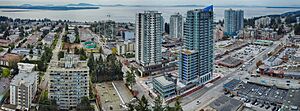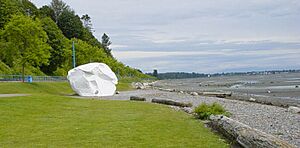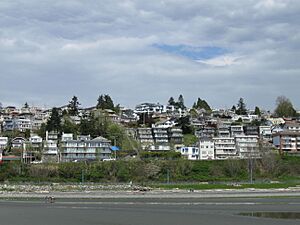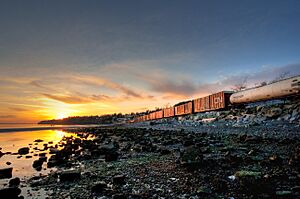White Rock, British Columbia facts for kids
Quick facts for kids
White Rock
|
|||
|---|---|---|---|
|
City
|
|||
| The Corporation of the City of White Rock | |||
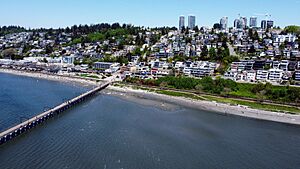
Aerial view of White Rock's waterfront
|
|||
|
|||
| Motto(s):
City by the Sea
|
|||
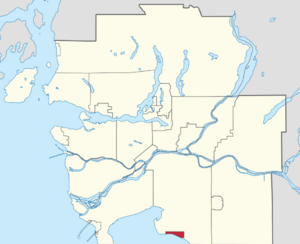
Location of White Rock in Metro Vancouver
|
|||
| Country | Canada | ||
| Province | British Columbia | ||
| Regional district | Metro Vancouver | ||
| Incorporated | April 15, 1957 | ||
| Seat | White Rock City Hall | ||
| Government | |||
| • Type | Mayor–council government | ||
| • Body | White Rock City Council | ||
| Area | |||
| • Land | 5.17 km2 (2.00 sq mi) | ||
| • Urban | 54.23 km2 (20.94 sq mi) | ||
| Elevation | 80 m (260 ft) | ||
| Population
(2021)
|
|||
| • City | 21,939 | ||
| • Estimate
(2023)
|
22,362 | ||
| • Density | 4,240.6/km2 (10,983/sq mi) | ||
| • Urban | 109,167 | ||
| • Urban density | 2,013.1/km2 (5,214/sq mi) | ||
| Time zone | UTC−08:00 (Pacific Standard Time) | ||
| • Summer (DST) | UTC−07:00 (Pacific Daylight Time) | ||
| Forward sortation area |
V4B
|
||
| Area codes | 604, 778, 236, 672 | ||
White Rock is a city in British Columbia, Canada. It is part of the Metro Vancouver Regional District. The city sits along Semiahmoo Bay to the south. It is surrounded on three sides by the city of Surrey.
White Rock gets its name from a large white rock on its beach. This huge 486-ton granite boulder was moved here by a glacier long ago. Sailors in the 1800s used it as a landmark. Today, the city keeps it white with paint. The famous White Rock Pier is also nearby.
Contents
History of White Rock
Early Days and First Peoples
The Straits Salish people lived in this area for a very long time. Their villages were along the waterfront where White Rock is today. They also built forts to watch for other groups.
In 1846, the Oregon Treaty set the border between Canada and the United States. This border runs through Semiahmoo Bay. The Semiahmoo Trail was an old path used by Indigenous people. It is still partly preserved today.
How White Rock Grew
White Rock's modern story began with the railway. A train line was built along the coast, connecting British Columbia to Washington state. This line, now owned by BNSF Railway, brought tourists to White Rock in the early 1900s.
The Peace Arch border crossing opened nearby in 1908. The famous White Rock Pier was built in 1914. It allowed bigger boats to dock.
In the 1950s, White Rock became its own city. This happened on April 15, 1957. The Peace Arch Hospital also opened around this time. It is still a major hospital for the area.
White Rock became known as a good place for retirement. It has less rain than Vancouver and mild weather. Later, a new highway, Highway 99, made it easier to travel to Vancouver. This helped White Rock grow even more.
In 1979, a huge sandcastle competition started on White Rock beach. It became very famous. People from all over came to build amazing sand sculptures. The event stopped in 1987 but was brought back in 2008 by local students and community members.
Today, White Rock is a mix of older homes and new buildings. Many families have moved here. In 2018, a big windstorm damaged the White Rock Pier. It was rebuilt and reopened in 2019.
White Rock's Geography
Where is White Rock Located?
White Rock is surrounded by Surrey on most sides. Its borders are Bergstrom Road to the west, North Bluff Road to the north, and Stayte Road to the east. To the south, across 8th Avenue, is the Semiahmoo Indian Reserve. Nearby Surrey neighborhoods include Ocean Park and Crescent Beach.
White Rock's Climate
White Rock has a mild climate all year. Summers are warm, with average highs around 23 degrees Celsius. Winters are cool, with average highs around 6 degrees Celsius.
The city gets more sunshine than Vancouver. It also has less fog and snow. This makes it a pleasant place to live and visit.
| Climate data for White Rock | |||||||||||||
|---|---|---|---|---|---|---|---|---|---|---|---|---|---|
| Month | Jan | Feb | Mar | Apr | May | Jun | Jul | Aug | Sep | Oct | Nov | Dec | Year |
| Record high °C (°F) | 16.5 (61.7) |
20.5 (68.9) |
22.6 (72.7) |
27.0 (80.6) |
31.5 (88.7) |
38.3 (100.9) |
34.0 (93.2) |
36.7 (98.1) |
30.5 (86.9) |
24.0 (75.2) |
20.5 (68.9) |
16.0 (60.8) |
38.3 (100.9) |
| Mean daily maximum °C (°F) | 7.3 (45.1) |
8.9 (48.0) |
11.5 (52.7) |
13.8 (56.8) |
17.0 (62.6) |
19.3 (66.7) |
21.5 (70.7) |
21.8 (71.2) |
19.3 (66.7) |
14.2 (57.6) |
9.3 (48.7) |
6.4 (43.5) |
14.2 (57.6) |
| Daily mean °C (°F) | 4.6 (40.3) |
5.7 (42.3) |
7.8 (46.0) |
10.0 (50.0) |
13.1 (55.6) |
15.4 (59.7) |
17.2 (63.0) |
17.4 (63.3) |
14.8 (58.6) |
10.7 (51.3) |
6.7 (44.1) |
3.8 (38.8) |
10.6 (51.1) |
| Mean daily minimum °C (°F) | 1.9 (35.4) |
2.4 (36.3) |
4.1 (39.4) |
6.2 (43.2) |
9.1 (48.4) |
11.5 (52.7) |
13.0 (55.4) |
13.0 (55.4) |
10.3 (50.5) |
7.2 (45.0) |
4.0 (39.2) |
1.2 (34.2) |
7.0 (44.6) |
| Record low °C (°F) | −12.0 (10.4) |
−14.0 (6.8) |
−7.2 (19.0) |
−1.1 (30.0) |
1.7 (35.1) |
3.9 (39.0) |
7.0 (44.6) |
6.0 (42.8) |
2.0 (35.6) |
−5.5 (22.1) |
−14.5 (5.9) |
−14.0 (6.8) |
−14.5 (5.9) |
| Average precipitation mm (inches) | 146.8 (5.78) |
99.3 (3.91) |
97.5 (3.84) |
83.4 (3.28) |
73.2 (2.88) |
59.6 (2.35) |
40.3 (1.59) |
37.2 (1.46) |
46.4 (1.83) |
111.0 (4.37) |
171.2 (6.74) |
139.7 (5.50) |
1,105.8 (43.54) |
| Average rainfall mm (inches) | 134.7 (5.30) |
93.6 (3.69) |
96.7 (3.81) |
83.4 (3.28) |
73.2 (2.88) |
59.6 (2.35) |
40.3 (1.59) |
37.2 (1.46) |
46.4 (1.83) |
110.7 (4.36) |
169.0 (6.65) |
130.5 (5.14) |
1,075.8 (42.35) |
| Average snowfall cm (inches) | 12.1 (4.8) |
5.7 (2.2) |
0.9 (0.4) |
0.0 (0.0) |
0.0 (0.0) |
0.0 (0.0) |
0.0 (0.0) |
0.0 (0.0) |
0.0 (0.0) |
0.3 (0.1) |
2.2 (0.9) |
9.2 (3.6) |
30.4 (12.0) |
| Average precipitation days (≥ 0.2 mm) | 17.6 | 14.3 | 15.7 | 14.3 | 12.3 | 11.4 | 7.1 | 6.0 | 7.9 | 15.1 | 18.8 | 17.0 | 157.4 |
| Average rainy days (≥ 0.2 mm) | 16.6 | 13.3 | 15.6 | 14.3 | 12.3 | 11.4 | 7.1 | 6.0 | 7.9 | 15.0 | 18.4 | 15.9 | 153.7 |
| Average snowy days (≥ 0.2 cm) | 1.9 | 1.6 | 0.4 | 0.1 | 0.0 | 0.0 | 0.0 | 0.0 | 0.0 | 0.1 | 0.8 | 2.1 | 6.9 |
People of White Rock
Population and Diversity
In 2021, White Rock had a population of 21,939 people. This was a small increase from 2016. The city is home to people from many different backgrounds.
The largest group is people of European heritage. However, there are also many people from East Asian, South Asian, and Indigenous backgrounds. This mix of cultures makes White Rock a diverse place.
Religious Beliefs in White Rock
Many people in White Rock do not follow a specific religion. Among those who do, Christianity is the most common faith. Other religions practiced in the city include Sikhism, Hinduism, Islam, Buddhism, and Judaism.
Fun Events in White Rock
Annual Festivals and Races
White Rock hosts several exciting events each year.
- Tour de White Rock: Every July, the city holds a bicycle road race. Over 150 riders from around the world compete.
- Spirit of the Sea Festival: This festival happens on White Rock beach during the first weekend of August. It includes a parade, fireworks, live music, and beach activities. The festival started in 1949.
Getting Around White Rock
Transportation Options
Most people in White Rock use cars to get around. Highway 99 connects White Rock to Vancouver in the north. It also leads to the U.S. border crossing.
Buses are also available. Many bus routes go through the White Rock Centre transit exchange. From there, you can connect to other cities like Richmond and Surrey.
A train track runs along White Rock beach. This track is mainly for freight trains carrying goods. It is also used by the Amtrak Cascades passenger train between Seattle and Vancouver.
Famous People from White Rock
Many talented people have lived in White Rock, including:
- Andy Anderson, a skateboarder
- Hilary Caldwell, an Olympic swimmer
- Paul Campbell, an actor from Battlestar Galactica
- Desirée Dawson, a singer who won the Searchlight talent contest
- Jason Garrison, a professional hockey player
- Christine Girard, an Olympic weightlifter
- Andrew Hammond, a hockey goaltender
- Ellie Harvie, an actress
- Jim Hughson, a sportscaster
- Moose Johnson, a Hockey Hall of Fame player
- Ra McGuire, singer and founder of the band Trooper
- Gabrielle Miller, an actress
- Hannah Simone, an actress from New Girl
- Cobie Smulders, an actress known for How I Met Your Mother
- Jewel Staite, an actress from Firefly
White Rock in Movies and TV
White Rock's beautiful scenery has been featured in several films and TV shows:
- Scenes from the boxing movie Knockout were filmed here.
- Parts of the 1965 film The Railrodder with Buster Keaton were shot in White Rock.
- The TV show Psych filmed scenes in White Rock, even though the show is set in California.
- The X-Files and the movie Driven to Kill also filmed scenes here.
- An episode of the TV series Better Things was filmed in White Rock.
- The Hallmark movie Like Cats & Dogs used many city scenes.
- The K-pop group Twice featured White Rock's pier and a local cafe in their 2018 music video Likey.
Images for kids
See also
 In Spanish: White Rock (Columbia Británica) para niños
In Spanish: White Rock (Columbia Británica) para niños
 | Calvin Brent |
 | Walter T. Bailey |
 | Martha Cassell Thompson |
 | Alberta Jeannette Cassell |




